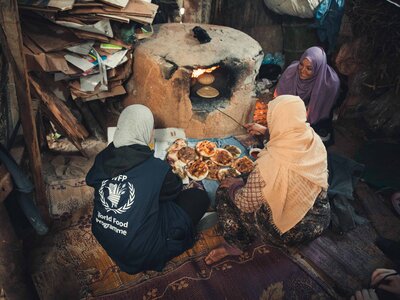Palestine
- 2.15 million
- people at crisis levels of hunger or worse
- Over 90 percent
- of the population faces acute levels of food insecurity
- 5.5 million
- population across Palestine
For decades, Palestine has been facing a protracted and complex protection and humanitarian crisis. The crisis is tied to prolonged occupation, internal political divisions, and recurrent conflict that pose a threat to stability and development of the Palestinian people.
Humanitarian conditions in Gaza deteriorated drastically following a sharp upsurge in violence in the region in early October 2023, with over 90 percent of the population facing acute food insecurity. The World Food Programme (WFP) scaled up to reach 1.3 million people in Gaza with life-saving food assistance after a ceasefire was declared.
However, hundreds of thousands of people in Gaza are again at risk of severe hunger and malnutrition following the resumption of military activity, as food stocks dwindle and borders remain closed to aid.
There is also deep concern over the escalating violence and movement restrictions in the West Bank, which are severely disrupting markets, livelihoods and food security. More than 40,000 people have been displaced since mid-January 2025.
What the World Food Programme is doing in Palestine
-
Food assistance
-
WFP provides unconditional food assistance, when this is possible. In addition to general food distributions - parcels that contain pasta, pulses and canned food - WFP also provides assistance through hot meals kitchens, and provides wheat flour, yeast, sugar and salt to bakeries to support local bread production. WFP also provides complementary nutritional supplements to pregnant and breastfeeding women, and children under 5 to meet their increased needs.
-
Livelihood support
-
WFP provides livelihoods interventions where conditions allow, such as climate-resilient agricultural assets and training, to households and smallholder farmers. This equips people with skills and tools to navigate and adapt their livelihoods to climate shocks and stressors. Through partnering with national institutions and local NGOs, WFP scaled up its resilience-building activities to include greenhouses, vegetable farms, sheep, poultry, and technical and vocational trainings for youth and people with disabilities. By introducing livelihood initiatives in Palestine, WFP helps enable the people we serve to access more basic needs while also boosting the local economy.
-
Capacity strengthening
-
WFP supports national institutions and promotes capacity-strengthening activities. WFP provides tools, guidance and technical expertise to enhance national institutions' ability to monitor and analyse food insecurity, strengthen the National Social Safety Net, and expand livelihood projects to support national partners in protecting food systems.
-
Enabling partners
-
As a key enabler for the humanitarian response across sectors, WFP has built systems for the wider humanitarian community to reach people. Through its cash-based transfer platform, WFP has supported humanitarian and development actors in reaching more Palestinians in need. WFP also provides logistics coordination and an inter-agency community feedback mechanism to partners.
Palestine news releases
Go to pagePartners and donors
Find out more about the state of food security in Palestine
Visit the food security analysis pageOperations in Palestine
Contacts
Office
c/o UNDP/PAPP 4A Yakubi Street, PO BOX 51359 Jerusalem, Israel
Jerusalem
Palestinian Territories






